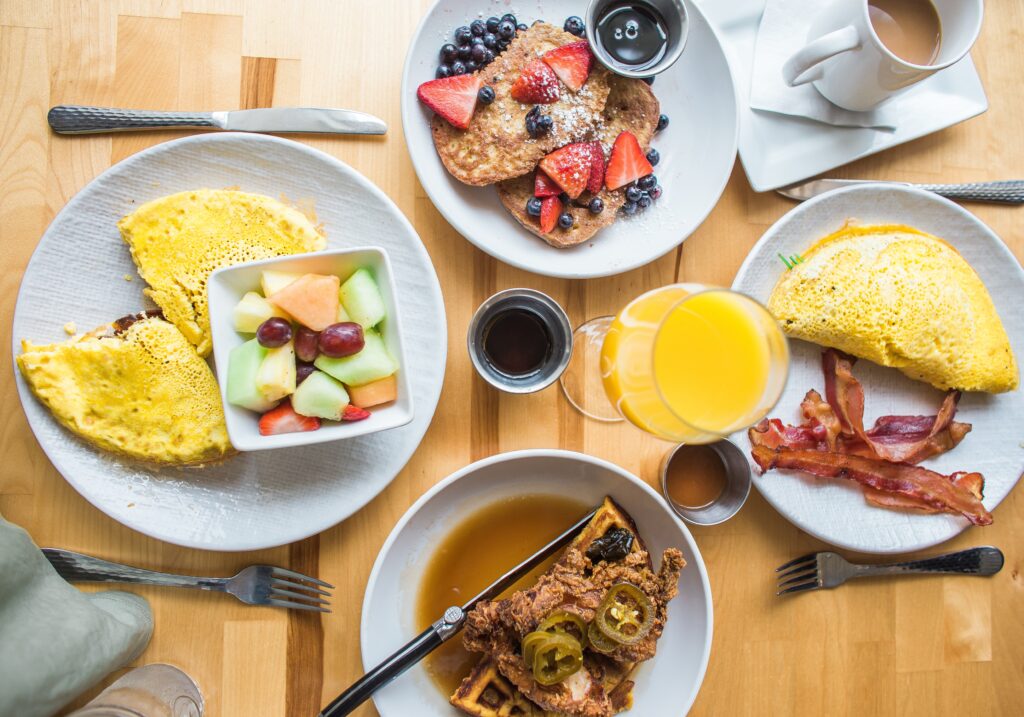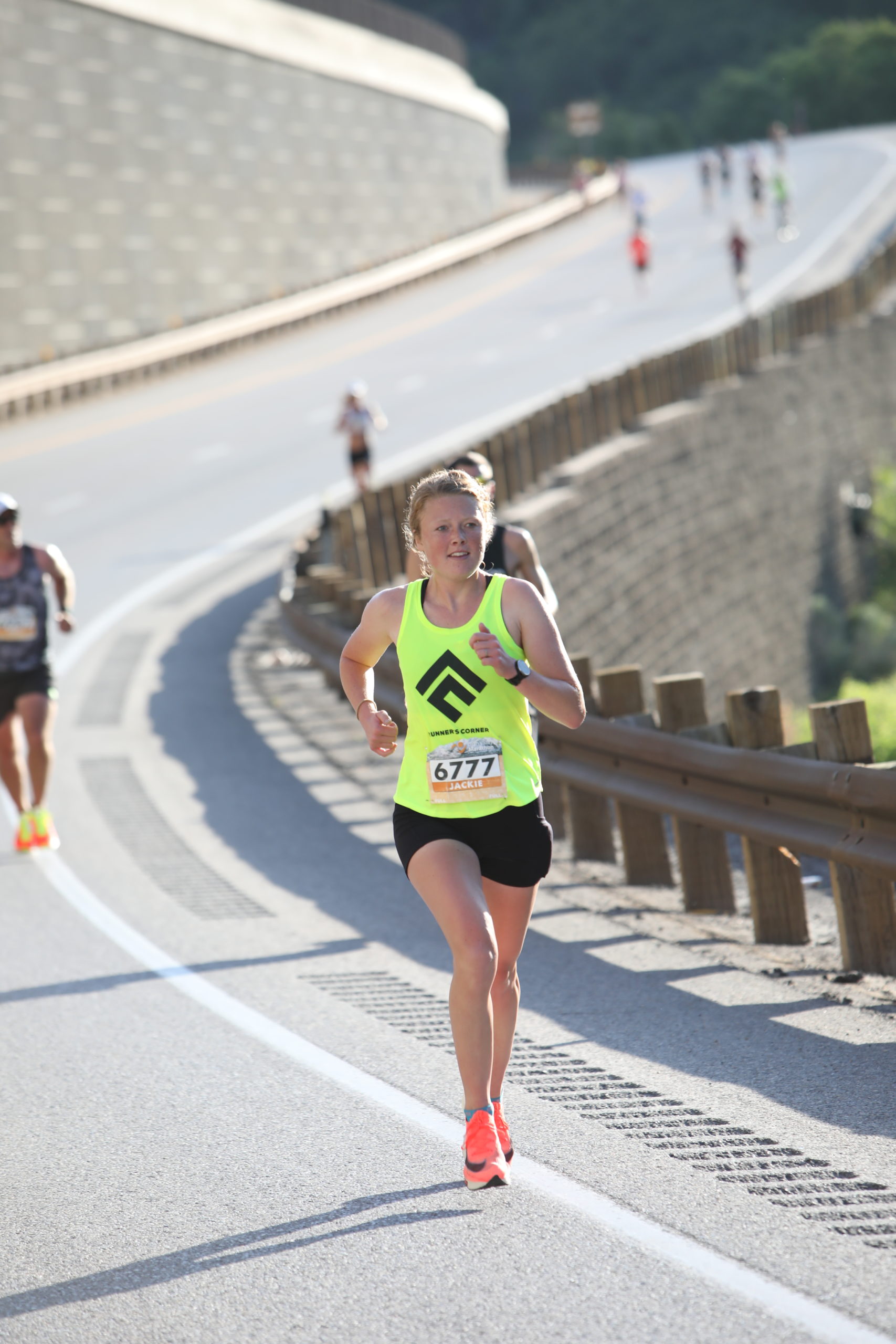Peak Performance: Pre-Race Nutrition

What should I eat before I race?! This is one of the most common questions I get from athletes as a registered dietitian – and for good reason too! You’ve put in the time & effort to meet your goals, and the last thing you want to do is mess up your fueling before the race even starts. To tackle this question, I’ll give you basic principles to follow for pre-race fueling that we can then apply to a few real-life scenarios. In those scenarios I will evaluate a pre-race eating plan for two different running distances. Unlocking your peak performance starts with proper pre-race nutrition. Let’s dig in!
Principles Of Pre-Race Fueling
I recommend 6 simple principles to follow when deciding what to eat prior to a workout or race. These 6 principles are key in unlocking peak performance. Here are the principles for pre-race fueling:
- Mostly carbohydrates
- Low fiber
- Low lactose
- Easy on the stomach
- Give it time to settle
- Fuel for the work required
During a race effort, your body will be using mainly carbohydrates as its energy source. As such, you will want to provide your body with simple, easy-to-digest carbohydrates to fuel your race as efficiently as possible. Focusing on carbohydrate-rich foods that are low in fiber will help reduce stomach and gut distress. Some go-to simple carbohydrates to include: white bagel, sourdough bread, graham crackers, white rice, and cream of wheat. Try to avoid “whole-grain” versions of these foods and save fibrous fruits and vegetables for after the race.
Listening To Your Specific Body Needs
Lactose is a sugar found in dairy products, particularly milk, that can be the culprit for excessive bathroom stops for many runners. If this is you, try to avoid meals and snacks that contain lactose for the 24 hours prior to your race (i.e. cereal with cow’s milk, yogurt, cheesy dishes, creamy pastas, etc.) This caution, however, does not apply to everyone. You do not need to avoid these foods for the 24 hours prior to a workout or race if you have no issues with lactose. This leads into the 4th principle, to choose foods that are “easy on the stomach.” Each athlete will have slightly different definitions of what sits well with them during a run. What works for you may or may not work for another athlete. Make sure to listen to your body specifically in regards to what it can and cannot tolerate well.
Give your pre-race meal plenty of time to settle. Usually this isn’t a problem on race day since athletes are typically awake for a few hours before the start of the race, but aim to eat your pre-race meal 2-3 hours prior to your event, if possible, to allow enough time for your food to comfortably digest.
Fuel For The Work Required
The last principle to follow is to “fuel for the work required,” a phrase coined by renowned sports dietitian Renee McGregor, RD. The longer and harder the effort, the more substantial your pre-race meal ought to be. What fuels you for a 30 minute easy jog will more than likely be inadequate for a 90 minute race. Practice eating more substantial meals prior to long runs and hard workouts in order to test what will work on race morning. Exact carbohydrate needs prior to a workout or race will vary from athlete to athlete, but the general recommendations are as such:
If eating 3-4 hours prior to your event, aim for 3-4 grams of carbohydrate per kilogram of body weight.
If eating 1-2 hours prior to your event, aim for 1-2 grams of carbohydrate per kilogram of body weight.
For a 150 lb (68 kg) athlete eating a pre-race meal 3 hours before a marathon, they will ideally aim for a meal with 200-270 grams of carbohydrate, or 800-1100 calories (with mostly carbohydrates).
This is a lot of carbohydrates! I find that most athletes tolerate about half of this recommendation when starting to be intentional with their fueling. With practice, a larger volume of carbohydrate is more easily digested. So, to start out with, I would recommend that the same 150 lb athlete aim for 100-135 grams of carbohydrate in a pre-race meal 3 hours prior to their race.
Evaluate My Pre-Race Eating Plan
In order to better understand the application of these principles, let’s discuss two hypothetical pre-race scenarios for that same 150 lb athlete – one for a half marathon race and one for a 100 mile ultra.
Half-Marathon
4:00 am: Wake Up
5:00 am: Breakfast
- two rice cakes with nut butter + a glass of water, glass of orange juice, and a cup of coffee
7:30 am: Race Start
Meal Totals
- 50 grams of carbohydrate
- 382 total calories
Dietitian Assessment:
For a pre-race breakfast 2.5 hours prior to this half-marathon, this athlete would want to aim for roughly 70-100 grams of carbohydrates. This could easily be achieved by simply swapping sourdough bread for rice cakes. If that is not an option for this athlete, they could try adding another glass of orange juice, 1 cup of applesauce, or 1 banana to this meal. These additions could be eaten either at 5:00 am or could also be consumed a bit later as a pre-race snack.
ADVERTISEMENT

100 Mile Ultra
4:00 am: Wake Up
6:00 am: Breakfast
- two pieces of French toast with syrup, bananas, and strawberries + a glass of water, glass of orange juice, and 2 cups of coffee
7:00 am Snack
- Larabar
7:30 am: Race Start
Meal & snack totals
- 825 calories
- 130 grams of carbohydrate
Dietitian Assessment:
Prior to an ultra-marathon, it would make logical sense to eat a larger, more substantial meal (as noted above). This may be the last full meal this athlete will consume for 24-36+ hours. With the lower intensity of an ultra-race, athletes often find that they can handle a wider variety of foods compared to a higher-intensity race. With this in mind, I would want this athlete to consume a meal with a minimum of 100-135 grams of carbohydrate. Which was done perfectly.
While the carbohydrate and caloric content of this meal are adequate, my question to this athlete would be “why are you waiting until 6:00 am to eat if you are awake at 4:00 am?” This is a large volume of food that may be better digested if eaten a bit earlier than 1.5 hours before the start of the race (with that said, there is absolutely nothing wrong with eating this meal that close to race time if the athlete is confident it will sit well with them).
My last bit of critique here is to make sure this athlete typically trains with 2 cups of coffee in their system. Caffeine is a fantastic aid for endurance athletes, but can also require an athlete to make extra bathroom stops. Caffeine can also lead to a greater degree of gastrointestinal discomfort. As long as this athlete has tolerated that amount of caffeine well before, they should be fine on race day.
Wrapping It Up
Nailing your pre-race meal is crucial to your success as an athlete. Focusing on the 6 basic principles of optimal pre-race fueling will help guide you in making the best personal decision. If you aren’t used to fueling prior to a race, start small and work your way up. You can add until you reach the full recommend amount of carbohydrate in your pre-race meal. Until then, remember that something is better than nothing!
References
- Rosenbloom, C. Sports Nutrition: A Practice Manual for Professionals. 5th Edition. Academy of Nutrition & Dietetics. 2015.
ADVERTISEMENT

Jackie Hendrickson RD, MPH is a registered dietitian with a Masters Degree in public health nutrition from Utah State University. Jackie is the owner of Enduura Nutrition and loves coaching her athletes to their athletic potential through sustainable training & nutrition principles. She is an avid road & trail marathoner with a background in collegiate track, cross country, and competitive swimming. Jackie and her husband, Adam, were teammates in college and continue to pursue their running goals together. They live in beautiful Ogden, Utah with their 2 year old son, Lincoln.

